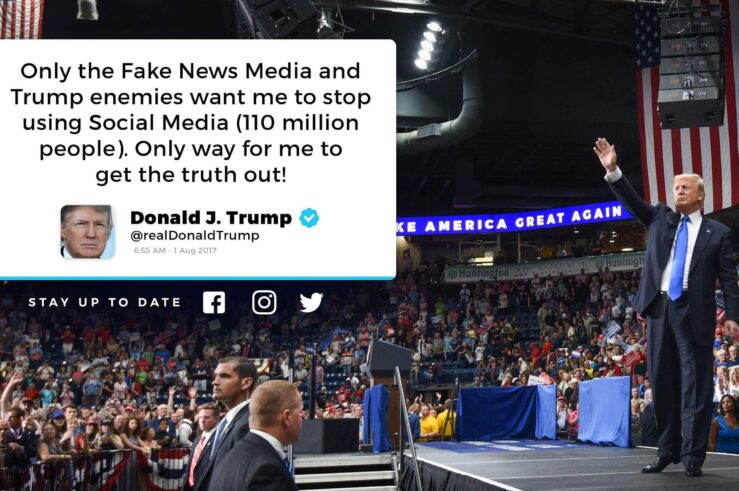Showing archive for: “News & Social Media”
Breaking up Facebook Would Be a Technical and Organizational Nightmare — and Would Almost Certainly Harm Consumers
[This post is the fifth in an ongoing symposium on “Should We Break Up Big Tech?” that features analysis and opinion from various perspectives.] [This post is authored by William Rinehart, Director of Technology and Innovation Policy at American Action Forum.] Back in May, the New York Times published an op-ed by Chris Hughes, one ... Breaking up Facebook Would Be a Technical and Organizational Nightmare — and Would Almost Certainly Harm Consumers
Separation without a Breakup
[This post is the fourth in an ongoing symposium on “Should We Break Up Big Tech?“that features analysis and opinion from various perspectives.] [This post is authored by Pallavi Guniganti, editor of Global Competition Review.] Start with the assumption that there is a problem The European Commission and Austria’s Federal Competition Authority are investigating Amazon ... Separation without a Breakup
Big Tech and Antitrust
[This post is the third in an ongoing symposium on “Should We Break Up Big Tech?” that will feature analysis and opinion from various perspectives.] [This post is authored by John E. Lopatka, Robert Noll Distinguished Professor of Law, School of Law, The Pennsylvania State University] Big Tech firms stand accused of many evils, and ... Big Tech and Antitrust
The Third Circuit’s Oberdorf v. Amazon opinion offers a good approach to reining in the worst abuses of Section 230
[Note: A group of 50 academics and 27 organizations, including both myself and ICLE, recently released a statement of principles for lawmakers to consider in discussions of Section 230.] In a remarkable ruling issued earlier this month, the Third Circuit Court of Appeals held in Oberdorf v. Amazon that, under Pennsylvania products liability law, Amazon ... The Third Circuit’s Oberdorf v. Amazon opinion offers a good approach to reining in the worst abuses of Section 230
There’s nothing “conservative” about Trump’s views on free speech and the regulation of social media
Yesterday was President Trump’s big “Social Media Summit” where he got together with a number of right-wing firebrands to decry the power of Big Tech to censor conservatives online. According to the Wall Street Journal: Mr. Trump attacked social-media companies he says are trying to silence individuals and groups with right-leaning views, without presenting specific ... There’s nothing “conservative” about Trump’s views on free speech and the regulation of social media
Section 230 principles for lawmakers and a note of caution as Trump convenes his “social media summit”
Neither side in the debate over Section 230 is blameless for the current state of affairs. Reform/repeal proponents have tended to offer ill-considered, irrelevant, or often simply incorrect justifications for amending or tossing Section 230. Meanwhile, many supporters of the law in its current form are reflexively resistant to any change and too quick to dismiss the more reasonable concerns that have been voiced. Most of all, the urge to politicize this issue — on all sides — stands squarely in the way of any sensible discussion and thus of any sensible reform.
Reports of the press’s death are greatly … understated
More than a century of bad news Bill Gates recently tweeted the image below, commenting that he is “always amazed by the disconnect between what we see in the news and the reality of the world around us.” Of course, this chart and Gates’s observation are nothing new – there has long been an accuracy ... Reports of the press’s death are greatly … understated
This Too Shall Pass: Unassailable Monopolies That Were, in Hindsight, Eminently Assailable
[N]ew combinations are, as a rule, embodied, as it were, in new firms which generally do not arise out of the old ones but start producing beside them; … in general it is not the owner of stagecoaches who builds railways. – Joseph Schumpeter, January 1934 Elizabeth Warren wants to break up the tech giants ... This Too Shall Pass: Unassailable Monopolies That Were, in Hindsight, Eminently Assailable
Elizabeth Warren wants to turn the internet into a literal sewer (service)
Near the end of her new proposal to break up Facebook, Google, Amazon, and Apple, Senator Warren asks, “So what would the Internet look like after all these reforms?” It’s a good question, because, as she herself notes, “Twenty-five years ago, Facebook, Google, and Amazon didn’t exist. Now they are among the most valuable and ... Elizabeth Warren wants to turn the internet into a literal sewer (service)
Doing double damage: The German competition authority’s Facebook decision manages to undermine both antitrust and data protection law
The German Bundeskartellamt's Facebook decision is unsound from either a competition or privacy policy perspective, and will only make the fraught privacy/antitrust relationship worse.
Why Negative Externalities Don’t Justify a Tax on Employers that Drive Up Demand for Housing
Writing in the New York Times, journalist E. Tammy Kim recently called for Seattle and other pricey, high-tech hubs to impose a special tax on Microsoft and other large employers of high-paid workers. Efficiency demands such a tax, she says, because those companies are imposing a negative externality: By driving up demand for housing, they ... Why Negative Externalities Don’t Justify a Tax on Employers that Drive Up Demand for Housing
Whole Foods? Seriously? Why Are We Talking About Whole Foods?
So why this deal, in this symposium, and why now? The best substantive reason I could think of is admittedly one that I personally find important. As I said, I think we should take it much more seriously as a general matter, especially in highly dynamic contexts like Silicon Valley. There has been a history of arguably pre-emptive, market-occupying vertical and conglomerate acquisitions, by big firms of smaller ones that are technologically or otherwise disruptive. The idea is that the big firms sit back and wait as some new market develops in some adjacent sector. When that new market ripens to the point of real promise, the big firm buys some significant incumbent player. The aim is not. just to facilitate its own benevolent, wholesome entry, but to set up hopefully prohibitive challenges to other de novo entrants. Love it or leave it, that theory plausibly characterizes lots and lots of acquisitions in recent decades that secured easy antitrust approval, precisely because they weren’t obviously, presently horizontal. Many people think that is true of some of Amazon’s many acquisitions, like its notoriously aggressive, near-hostile takeover of Diapers.com.







